人教版八年级上册 Unit 1 Where did you go on vacation? Section B 词汇讲解课件 (共23张PPT)
文档属性
| 名称 | 人教版八年级上册 Unit 1 Where did you go on vacation? Section B 词汇讲解课件 (共23张PPT) | 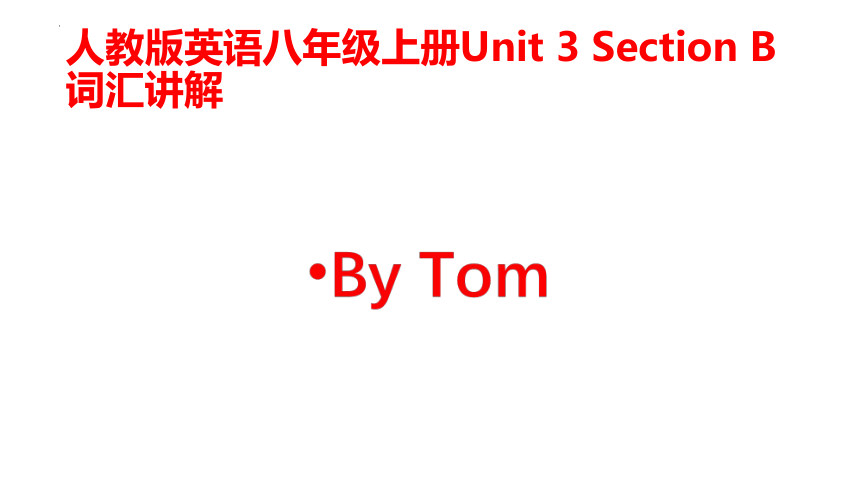 | |
| 格式 | zip | ||
| 文件大小 | 95.0KB | ||
| 资源类型 | 教案 | ||
| 版本资源 | 人教新目标(Go for it)版 | ||
| 科目 | 英语 | ||
| 更新时间 | 2022-08-15 01:53:41 | ||
图片预览

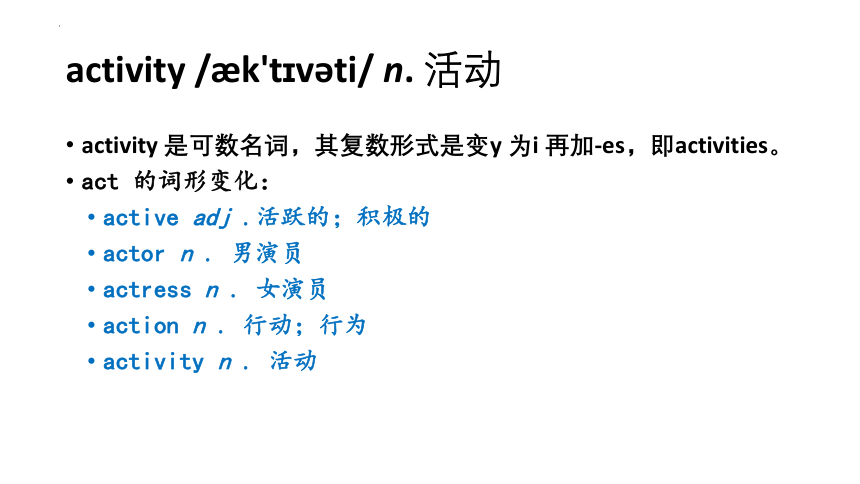
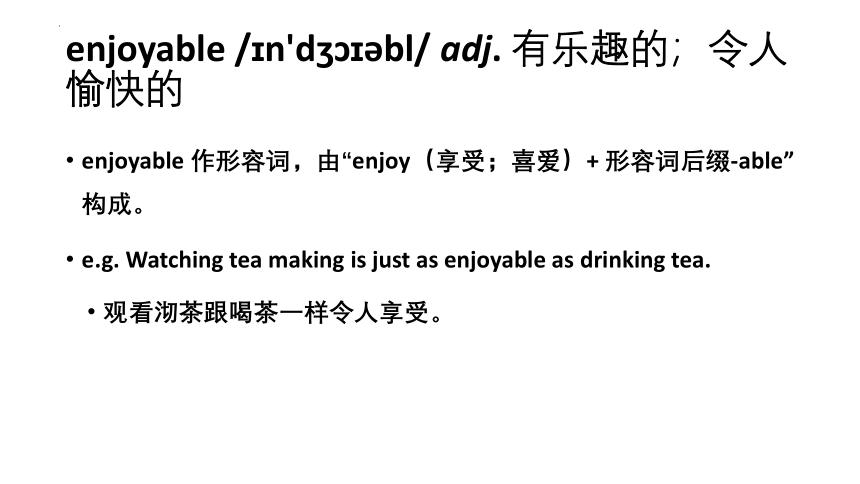
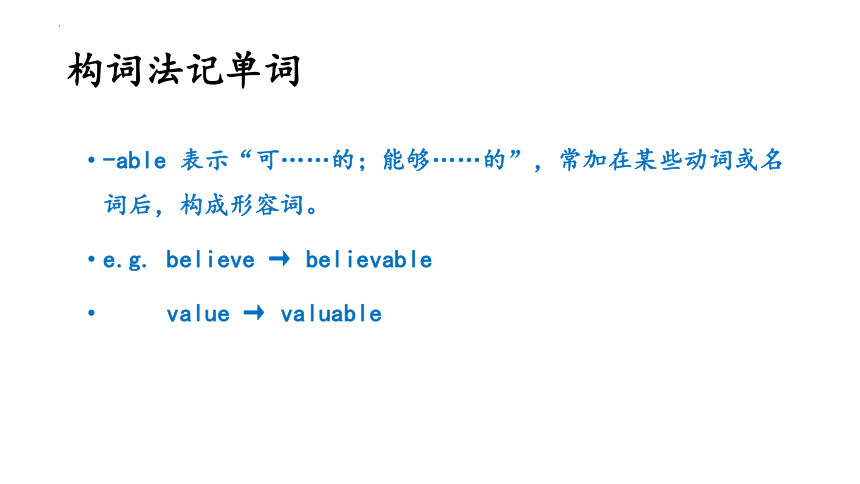
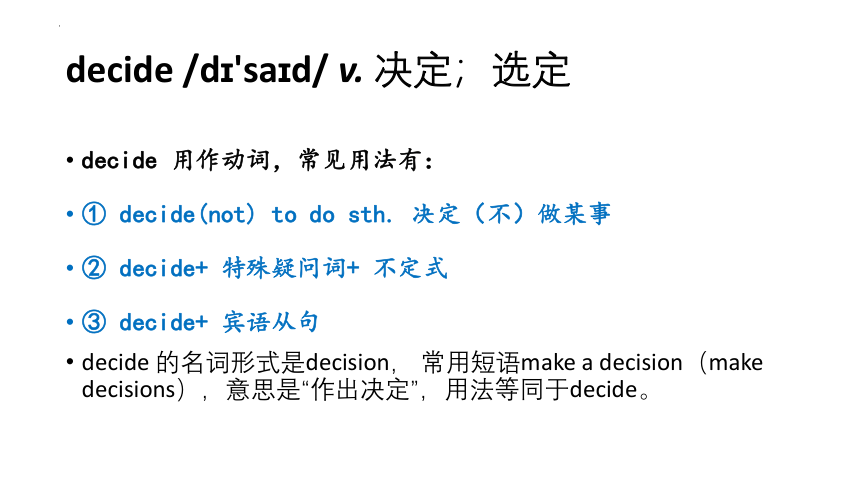
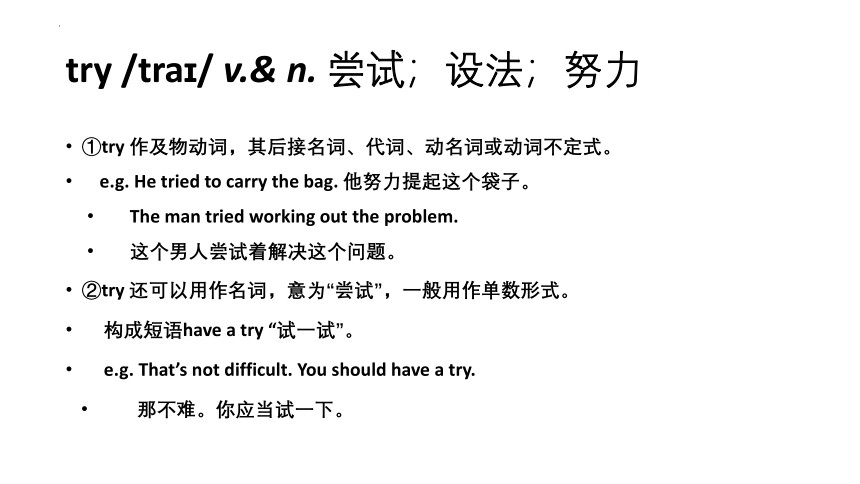
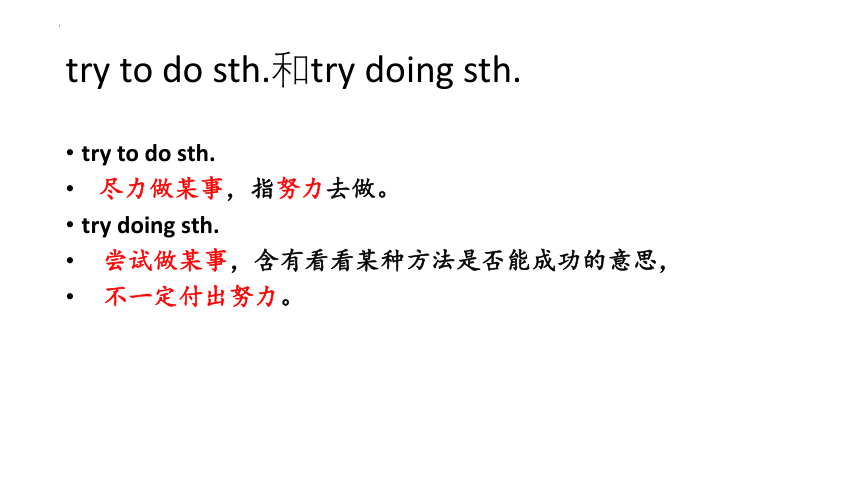
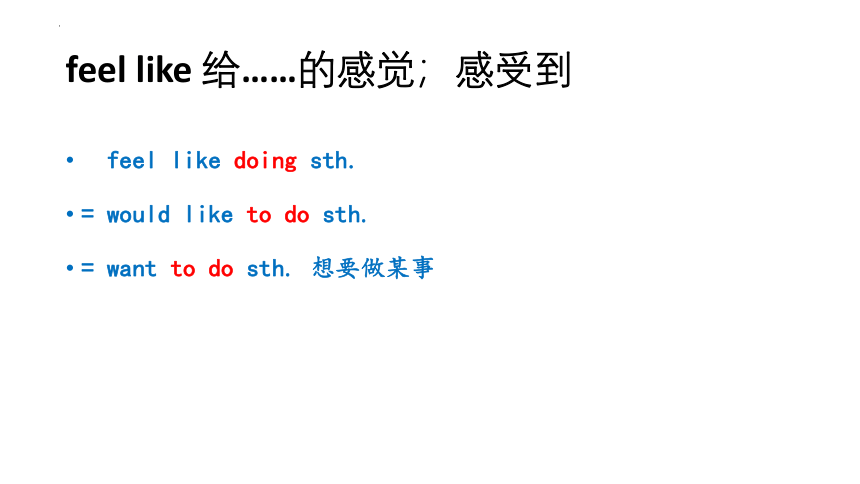
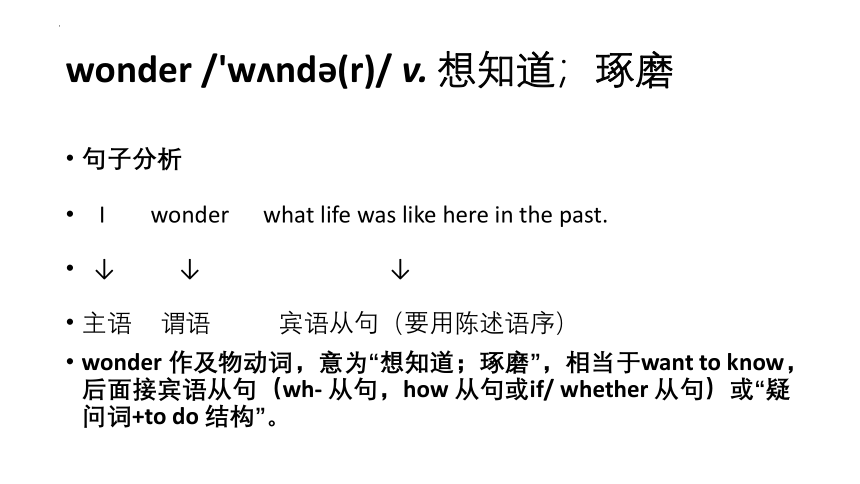
文档简介
(共23张PPT)
人教版英语八年级上册Unit 3 Section B
词汇讲解
activity / k't v ti/ n. 活动
activity 是可数名词,其复数形式是变y 为i 再加-es,即activities。
act 的词形变化:
active adj .活跃的;积极的
actor n . 男演员
actress n . 女演员
action n . 行动;行为
activity n . 活动
enjoyable / n'd bl/ adj. 有乐趣的;令人愉快的
enjoyable 作形容词,由“enjoy(享受;喜爱)+ 形容词后缀-able”构成。
e.g. Watching tea making is just as enjoyable as drinking tea.
观看沏茶跟喝茶一样令人享受。
构词法记单词
-able 表示“可……的;能够……的”,常加在某些动词或名词后,构成形容词。
e.g. believe → believable
value → valuable
decide /d 'sa d/ v. 决定;选定
decide 用作动词,常见用法有:
① decide(not) to do sth. 决定(不)做某事
② decide+ 特殊疑问词+ 不定式
③ decide+ 宾语从句
decide 的名词形式是decision, 常用短语make a decision(make decisions),意思是“作出决定”,用法等同于decide。
try /tra / v.& n. 尝试;设法;努力
①try 作及物动词,其后接名词、代词、动名词或动词不定式。
e.g. He tried to carry the bag. 他努力提起这个袋子。
The man tried working out the problem.
这个男人尝试着解决这个问题。
②try 还可以用作名词,意为“尝试”,一般用作单数形式。
构成短语have a try “试一试”。
e.g. That’s not difficult. You should have a try.
那不难。你应当试一下。
try to do sth.和try doing sth.
try to do sth.
尽力做某事,指努力去做。
try doing sth.
尝试做某事,含有看看某种方法是否能成功的意思,
不一定付出努力。
feel like 给……的感觉;感受到
feel like doing sth.
= would like to do sth.
= want to do sth. 想要做某事
wonder /'w nd (r)/ v. 想知道;琢磨
句子分析
I wonder what life was like here in the past.
↓ ↓ ↓
主语 谓语 宾语从句(要用陈述语序)
wonder 作及物动词,意为“想知道;琢磨”,相当于want to know,后面接宾语从句(wh- 从句,how 从句或if/ whether 从句)或“疑问词+to do 结构”。
wonder /'w nd (r)/ v. 想知道;琢磨
wonder 还可作名词,作不可数名词时,意为“惊讶,惊奇”;作可数名词时,意为“奇迹,奇观”。
e.g. I wonder why the wonders are so wonderful that
thousands of people visit them every year.
我想知道为什么这些奇观如此绝妙以至于每年成千上万的人都去参观它们。
I was listening to his story with wonder.
我吃惊地听着他的故事。
enjoy v. 喜欢;享受……的乐趣
enjoy 是及物动词,后接名词、代词或动名词作宾语。
enjoy oneself 意为“玩得开心;过得愉快”。
相当于have a good/nice/great time
或have fun。
difference /'d fr ns/ n. 差别;差异
difference 是形容词different 的名词形式,既可以作可数名词,也可以作不可数名词。
difference 常构成短语:
① make a difference to... 对……有影响;起作用
② make no difference 没影响
③ the difference(s) between... and...
……和……两者间的不同点
top /t p/ n. 顶部;表面
top表示“顶部”时,其反义词是bottom,常用短语at the bottom of...(在……底部)。
(1)作名词,意为“顶部”,常用短语on/ at the top of“ 在……顶部”。
e.g. There is a bird on the top of the tree. 树顶上有一只鸟。
(2)作名词,意为“表面”。
e.g. Can you clean the top of the desk 你能清理一下桌面吗?
(3)作形容词,意为“顶级的;顶尖的”,相当于best。
e.g. There are many top table tennis players in China.
在中国有许多顶尖的乒乓球选手。
wait /we t/ v. 等待;等候
wait 的常用搭配:
① wait for sb./sth. 等待某人或某物
② wait (for sb./sth.) to do sth. 等待(某人/某物)做某事
③ can’t wait to do sth. 迫不及待做某事
④ wait a moment/minute/second 稍等一下
over prep. 超过
=more than
over 作介词时其他常见用法:
(1)从一边到另一边
e.g. There is a bridge over the river. 河流上有一座桥。
(2)在……上方
e.g. A light hangs over the table. 一盏电灯悬挂在桌子上方。
over prep. 超过
(3)遍及;遍布
e.g. Hangzhou green tea is known all over the world.
杭州绿茶闻名全世界。
(4)超过;多于
e.g. His grandma is over 70 years old. 他的奶奶70 多岁了。
because of 因为
because of 与because
because of
介词短语,后接名词、代词或名词性短语。
because
连词,后面只能接句子,表示直接、明确的原因。
because 和because of 的句型转换
He didn’t come to school today because he was ill.
= He didn’t come to school today because of his illness.
今天他没有来上学,因为他病了。
below /b 'l / prep. & adv. 在……下面;到……下面
e.g. Please read the rules below carefully.
请认真阅读下面的规则。
The temperature in our hometown usually drops below zero in winter.
冬天我们家乡的气温通常降到零度以下。
(位置)在……下面
(数量、标准、级别)在…… 以下,低于
below 与 under
below
表示在某物下方,但不一定是在正下方,其反义词为above。
under
指“在……的下方”,有垂直关系,其反义词为 over。
enough / 'n f/ adj. & adv. 足够的( 地);充足的( 地);充分的(地)
①enough 作形容词,修饰名词,通常放在名词前面,
也可以放在名词后面。
②enough 还可以作副词,用来修饰形容词或副词,
此时要放在形容词或副词的后面。
③“be (not)+adj.+enough+ 动词不定式”是enough的
一种常用结构,意思是“(不)足够……做某事”。
enough在句中的位置:
修饰名词很自由,可以前来也可后。
若是修饰动副形,放在前面可不行。
as / z; z/ adv. 像……一样;如同
conj. 当……时;如同
as用于表示程度,后面接形容词或副词的原级,常用
于“as...as”结构,其否定形式是“not as/so... as”。有时第二个as及后面的成分在语境比较明显的情况下可以省略。
dislike /d s'la k/ v.& n. 不喜爱(的事物);厌恶(的事物)
构词法记单词
否定前缀dis-加在某些形容词、动词之前,
构成其反义词。
e.g. appear → disappear
honest → dishonest
obey → disobey
agree → disagree
谢谢观看
Thank you for watching!
人教版英语八年级上册Unit 3 Section B
词汇讲解
activity / k't v ti/ n. 活动
activity 是可数名词,其复数形式是变y 为i 再加-es,即activities。
act 的词形变化:
active adj .活跃的;积极的
actor n . 男演员
actress n . 女演员
action n . 行动;行为
activity n . 活动
enjoyable / n'd bl/ adj. 有乐趣的;令人愉快的
enjoyable 作形容词,由“enjoy(享受;喜爱)+ 形容词后缀-able”构成。
e.g. Watching tea making is just as enjoyable as drinking tea.
观看沏茶跟喝茶一样令人享受。
构词法记单词
-able 表示“可……的;能够……的”,常加在某些动词或名词后,构成形容词。
e.g. believe → believable
value → valuable
decide /d 'sa d/ v. 决定;选定
decide 用作动词,常见用法有:
① decide(not) to do sth. 决定(不)做某事
② decide+ 特殊疑问词+ 不定式
③ decide+ 宾语从句
decide 的名词形式是decision, 常用短语make a decision(make decisions),意思是“作出决定”,用法等同于decide。
try /tra / v.& n. 尝试;设法;努力
①try 作及物动词,其后接名词、代词、动名词或动词不定式。
e.g. He tried to carry the bag. 他努力提起这个袋子。
The man tried working out the problem.
这个男人尝试着解决这个问题。
②try 还可以用作名词,意为“尝试”,一般用作单数形式。
构成短语have a try “试一试”。
e.g. That’s not difficult. You should have a try.
那不难。你应当试一下。
try to do sth.和try doing sth.
try to do sth.
尽力做某事,指努力去做。
try doing sth.
尝试做某事,含有看看某种方法是否能成功的意思,
不一定付出努力。
feel like 给……的感觉;感受到
feel like doing sth.
= would like to do sth.
= want to do sth. 想要做某事
wonder /'w nd (r)/ v. 想知道;琢磨
句子分析
I wonder what life was like here in the past.
↓ ↓ ↓
主语 谓语 宾语从句(要用陈述语序)
wonder 作及物动词,意为“想知道;琢磨”,相当于want to know,后面接宾语从句(wh- 从句,how 从句或if/ whether 从句)或“疑问词+to do 结构”。
wonder /'w nd (r)/ v. 想知道;琢磨
wonder 还可作名词,作不可数名词时,意为“惊讶,惊奇”;作可数名词时,意为“奇迹,奇观”。
e.g. I wonder why the wonders are so wonderful that
thousands of people visit them every year.
我想知道为什么这些奇观如此绝妙以至于每年成千上万的人都去参观它们。
I was listening to his story with wonder.
我吃惊地听着他的故事。
enjoy v. 喜欢;享受……的乐趣
enjoy 是及物动词,后接名词、代词或动名词作宾语。
enjoy oneself 意为“玩得开心;过得愉快”。
相当于have a good/nice/great time
或have fun。
difference /'d fr ns/ n. 差别;差异
difference 是形容词different 的名词形式,既可以作可数名词,也可以作不可数名词。
difference 常构成短语:
① make a difference to... 对……有影响;起作用
② make no difference 没影响
③ the difference(s) between... and...
……和……两者间的不同点
top /t p/ n. 顶部;表面
top表示“顶部”时,其反义词是bottom,常用短语at the bottom of...(在……底部)。
(1)作名词,意为“顶部”,常用短语on/ at the top of“ 在……顶部”。
e.g. There is a bird on the top of the tree. 树顶上有一只鸟。
(2)作名词,意为“表面”。
e.g. Can you clean the top of the desk 你能清理一下桌面吗?
(3)作形容词,意为“顶级的;顶尖的”,相当于best。
e.g. There are many top table tennis players in China.
在中国有许多顶尖的乒乓球选手。
wait /we t/ v. 等待;等候
wait 的常用搭配:
① wait for sb./sth. 等待某人或某物
② wait (for sb./sth.) to do sth. 等待(某人/某物)做某事
③ can’t wait to do sth. 迫不及待做某事
④ wait a moment/minute/second 稍等一下
over prep. 超过
=more than
over 作介词时其他常见用法:
(1)从一边到另一边
e.g. There is a bridge over the river. 河流上有一座桥。
(2)在……上方
e.g. A light hangs over the table. 一盏电灯悬挂在桌子上方。
over prep. 超过
(3)遍及;遍布
e.g. Hangzhou green tea is known all over the world.
杭州绿茶闻名全世界。
(4)超过;多于
e.g. His grandma is over 70 years old. 他的奶奶70 多岁了。
because of 因为
because of 与because
because of
介词短语,后接名词、代词或名词性短语。
because
连词,后面只能接句子,表示直接、明确的原因。
because 和because of 的句型转换
He didn’t come to school today because he was ill.
= He didn’t come to school today because of his illness.
今天他没有来上学,因为他病了。
below /b 'l / prep. & adv. 在……下面;到……下面
e.g. Please read the rules below carefully.
请认真阅读下面的规则。
The temperature in our hometown usually drops below zero in winter.
冬天我们家乡的气温通常降到零度以下。
(位置)在……下面
(数量、标准、级别)在…… 以下,低于
below 与 under
below
表示在某物下方,但不一定是在正下方,其反义词为above。
under
指“在……的下方”,有垂直关系,其反义词为 over。
enough / 'n f/ adj. & adv. 足够的( 地);充足的( 地);充分的(地)
①enough 作形容词,修饰名词,通常放在名词前面,
也可以放在名词后面。
②enough 还可以作副词,用来修饰形容词或副词,
此时要放在形容词或副词的后面。
③“be (not)+adj.+enough+ 动词不定式”是enough的
一种常用结构,意思是“(不)足够……做某事”。
enough在句中的位置:
修饰名词很自由,可以前来也可后。
若是修饰动副形,放在前面可不行。
as / z; z/ adv. 像……一样;如同
conj. 当……时;如同
as用于表示程度,后面接形容词或副词的原级,常用
于“as...as”结构,其否定形式是“not as/so... as”。有时第二个as及后面的成分在语境比较明显的情况下可以省略。
dislike /d s'la k/ v.& n. 不喜爱(的事物);厌恶(的事物)
构词法记单词
否定前缀dis-加在某些形容词、动词之前,
构成其反义词。
e.g. appear → disappear
honest → dishonest
obey → disobey
agree → disagree
谢谢观看
Thank you for watching!
同课章节目录
- Unit 1 Where did you go on vacation?
- Section A
- Section B
- Unit 2 How often do you exercise?
- Section A
- Section B
- Unit 3 I'm more outgoing than my sister.
- Section A
- Section B
- Unit 4 What's the best movie theater?
- Section A
- Section B
- Unit 5 Do you want to watch a game show?
- Section A
- Section B
- Unit 6 I'm going to study computer science.
- Section A
- Section B
- Unit 7 Will people have robots?
- Section A
- Section B
- Unit 8 How do you make a banana milk shake?
- Section A
- Section B
- Unit 9 Can you come to my party?
- Section A
- Section B
- Unit 10 If you go to the party, you'll have a grea
- Section A
- Section B
